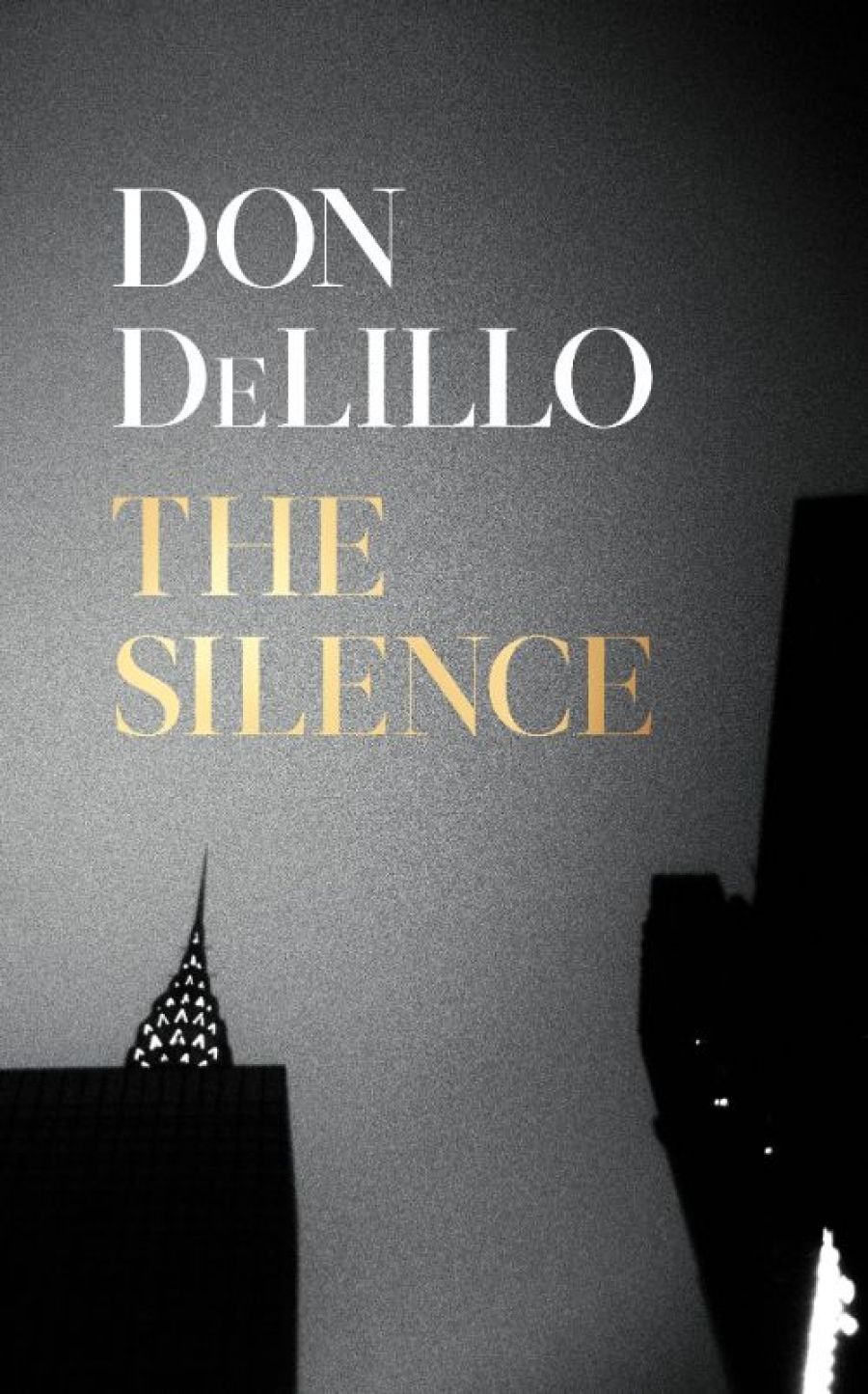
- Free Article: No
- Contents Category: Fiction
- Review Article: Yes
- Article Title: Universal blackout
- Article Subtitle: A minimalist with much content
- Custom Highlight Text:
‘Literary talent,’ writes Martin Amis in his new ‘novel’, Inside Story, ‘has perhaps four or five ways of dying. Most writers simply become watery and subtly stale.’ Not so the eighty-three-year-old Don DeLillo, who has published seventeen novels over the last fifty years, all of them muscular, intelligent, prescient. In 1988, he told an interviewer from Rolling Stone, ‘I think fiction rescues history from its confusions.’
- Featured Image (400px * 250px):

- Book 1 Title: The Silence
- Book 1 Subtitle: A novel
- Book 1 Biblio: Picador, $29.99 hb, 116 pp
- Book 1 Readings Link: booktopia.kh4ffx.net/52M31
The Silence was finished in March this year, just before the coronavirus lockdown in New York where DeLillo lives, though the novel is not ostensibly about this pandemic. Indeed, DeLillo has said: ‘I wondered what would happen if power failed everywhere, nothing functioning … a universal blackout.’ What might cause such a blackout? A virus.
This novel begins in business class on a plane from Paris to Newark, New Jersey. Jim Kripps, a claims adjuster for an insurance company, and his wife, Tessa Berens, ‘dark-skinned, Caribbea-European-Asian origins, a poet whose work appeared often in literary journals’, are returning to New York to watch television with friends. The big deal? It is Super Sunday 2022. Diane Lucas, former physics professor, her husband Max Stenner, building code inspector, and Martin Dekker, Diane’s former student now physics teacher to gifted college students, obsessed with Einstein, are gathered in an eighth-floor Manhattan apartment in front of a television awaiting Jim and Tessa, who have been delayed due to an in-air aeroplane event, to watch the Super Bowl. At kick-off, the television dies, as do phones, the fridge, the elevator, the power, traffic lights … It may be a local hiccup or a Universal Blackout. No one can tell. How could one?
Martin says, ‘It could be algorithmic governance. The Chinese. They play American football ... The joke is on us. They’ve initiated a selective internet apocalypse. They are watching, we are not.’ Physicists’ paranoia? Where have we heard this before? Though Diane says: ‘Nobody is smarter than the Chinese except for Martin.’
Jim, with a bandaged forehead from the aeroplane event, and Tessa arrive having proceeded across Manhattan on foot after a detour to the emergency ward of a hospital, and up the eight flights of stairs to the apartment. After the trauma of the plane’s landing, they need a nap in the apartment’s one bedroom. Their hosts speculate as to whether they are screwing. (They already have, in the hospital toilet.) Max, having consumed a considerable part of a bottle of Widow Jane bourbon (it exists, and it’s not cheap), insists on going out into the streets for a walk on his own. On his return he encounters crowds. ‘He will have to muscle his way through the crowd … a thousand faces every minute, people wrestling, throwing punches, a small riot here and there … He walks into the streaming mass.’ Impossible not to think of the last words of ‘At Yankee Stadium’, the preamble to DeLillo’s 1991 novel, Mao II: ‘The future belongs to crowds.’
 Don DeLillo, 2000 (Basso Cannarsa/Agence Opale/Alamy)
Don DeLillo, 2000 (Basso Cannarsa/Agence Opale/Alamy)
It is also impossible reading The Silence not to think of the central section of DeLillo’s career-establishing 1985 novel White Noise, titled ‘The Airborne Toxic Event’, or to consider the later novel as a cosmic Covid-begat version of it. DeLillo has long treasured his facsimile of the manuscript of Einstein’s 1912 Special Theory of Relativity, and his physicist professor Martin quotes again and again from it, more frequently and insistently as The Silence proceeds to its end, where he has the almost-last word. ‘The world is everything, the individual is nothing. Do we all understand that?’ But the novel ends: ‘Max is not listening. … He stares in to the blank screen.’
Of the novel’s crisis, Martin says: ‘Nobody wants to call it World War III but this is what it is.’ It is not merely that Einstein is insistently cited by Martin throughout the novel; he is also awarded pride of place as the novel’s epigraph. ‘I do not know with what weapons World War III will be fought, but World War IV will be fought with sticks and stones.’ That would be after the ‘total collapse of all systems’. Pay attention, world leaders.
Diane reflects on ‘The physics of time. Absolute time. Time’s arrow. Time and space.’ She then quotes a ‘stray line’ from Finnegans Wake, a book she’s been reading ‘on and off, here and there, for what seems like forever … Ere the sockson locked at the dure.’ The Joyce may be a book as much talked about but as little understood as the Einstein. Perhaps that is why it is cited in this DeLillo novel. But Einstein would seem more germane to DeLillo’s concerns. Perhaps the future belongs to drones. Martin again: ‘The drone wars. Never mind country of origin. The drones have become autonomous … Their weapon being a form of language isolate. A language known only to drones.’
The Silence makes H.G. Wells’s The War of the Worlds look like a vicarage tea party, perhaps because, in the DeLillo, there is only this world, where the future belongs to crowds. But what if there are no crowds? What if there is no future?
‘And universal Darkness buries all.’


Comments powered by CComment